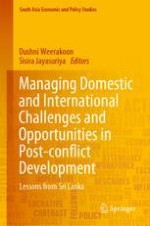
2019 | OriginalPaper | Buchkapitel
Introduction: Challenges and Opportunities of Sri Lanka’s Post-conflict Economic Development Overview
verfasst von : Sisira Jayasuriya, Dushni Weerakoon
Erschienen in: Managing Domestic and International Challenges and Opportunities in Post-conflict Development
Verlag: Springer Singapore
Aktivieren Sie unsere intelligente Suche, um passende Fachinhalte oder Patente zu finden.
Wählen Sie Textabschnitte aus um mit Künstlicher Intelligenz passenden Patente zu finden. powered by
Markieren Sie Textabschnitte, um KI-gestützt weitere passende Inhalte zu finden. powered by